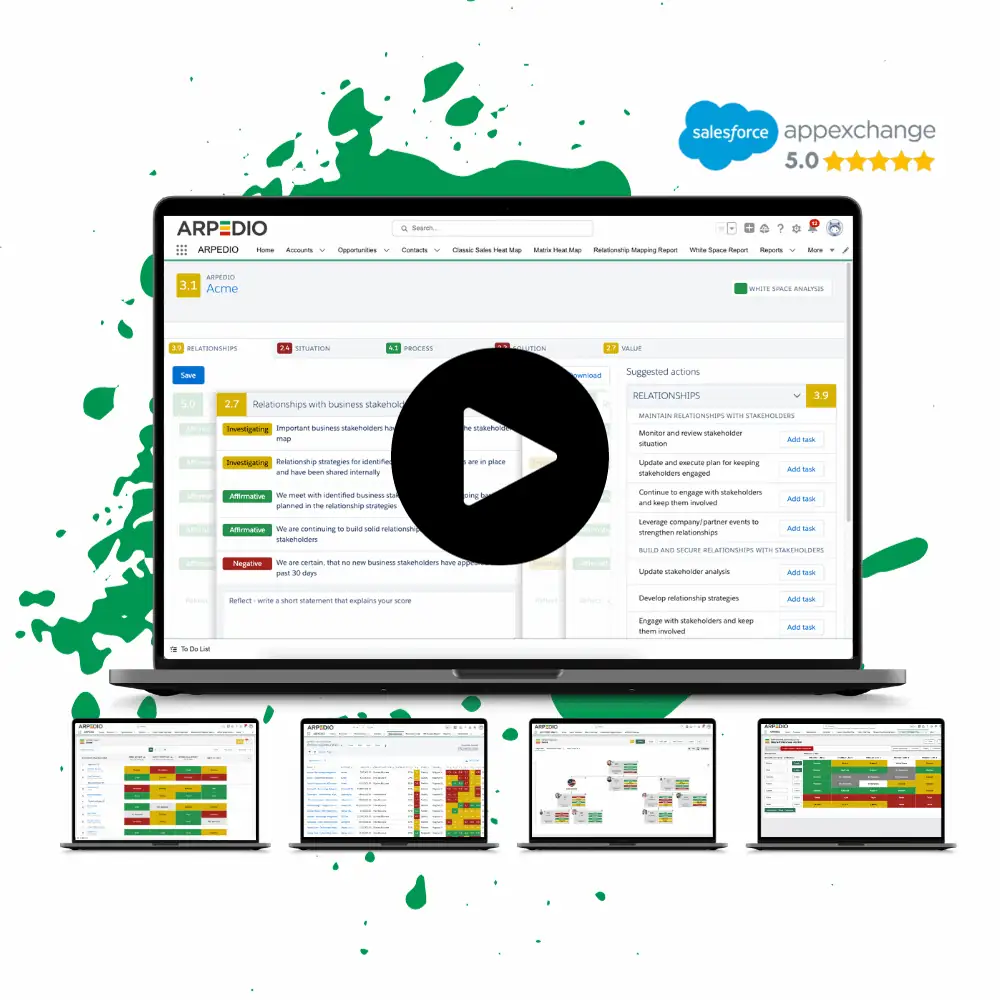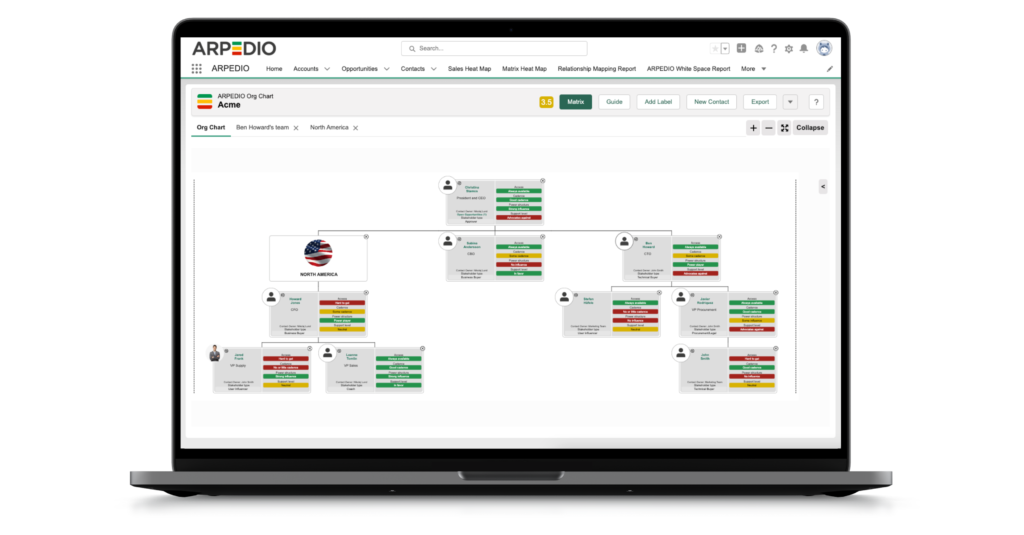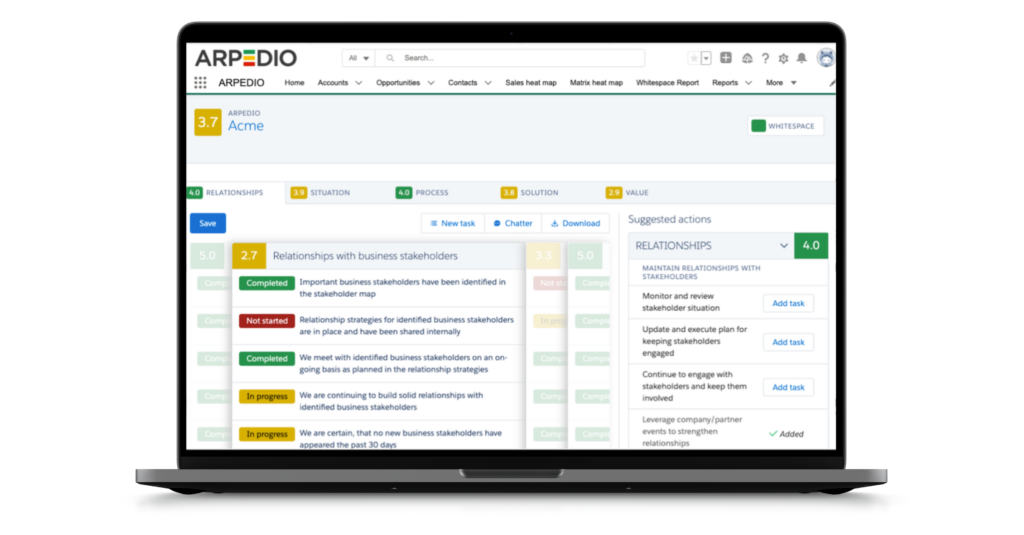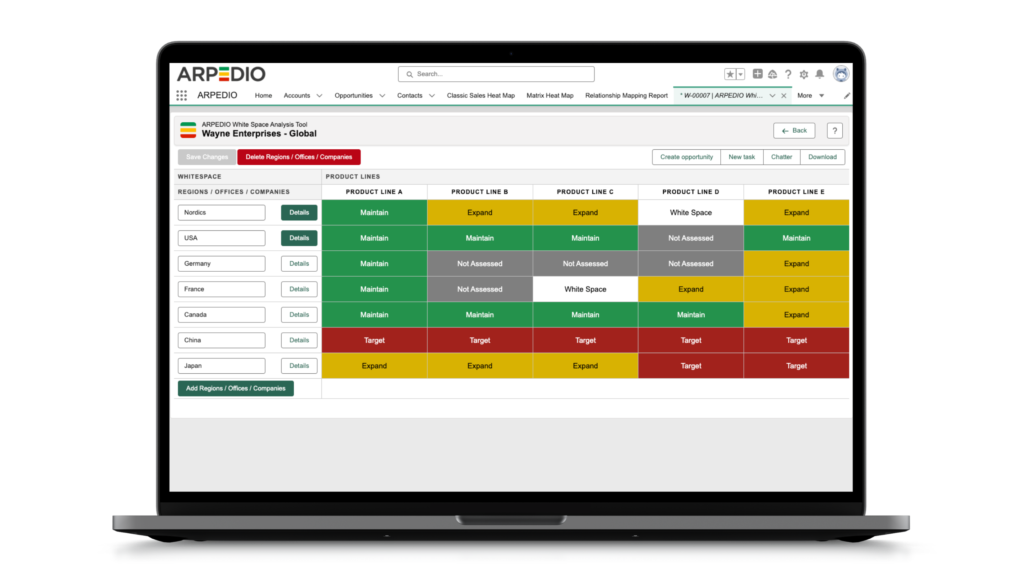In the ever-evolving world of enterprise sales, strategies and tools are constantly refined to meet the dynamic needs of businesses. On a recent episode of the “Thoughts on Selling” podcast, host Lee Levitt sat down with Ulrik Monberg, CEO of ARPEDIO, to delve deep into the realm of account-based selling. Their conversation shed light on the transition from traditional CRM systems to strategic account planning, the essence of account-based selling, and the futuristic role of AI in sales.
Table of Contents
This article is based on an episode of the Thoughts On Selling™ Podcast hosted by Lee Lewitt, Principal Sales Productivity Consultant at the Acelera Group. In this episode, Lee interviews Ulrik Monberg, Founder and CEO of ARPEDIO, to explore the keys to success in Account-Based Selling.
Listen to the podcast here.
From CRM to Strategic Account Planning
The role of Customer Relationship Management (CRM) tools has witnessed a significant transformation over the past decade. What began as simple, almost Excel-like systems to manage customer interactions has morphed into comprehensive platforms that address myriad customer-related processes. As Ulrik Monberg aptly pointed out, Salesforce, one of the pioneers in the CRM space, has grown exponentially to incorporate any customer-related process within its universe. However, this is just a drop in the ocean when considering the broader spectrum of strategic account needs that business professionals grapple with daily.
Account-Based Selling vs. Traditional Account Plans
A vivid anecdote shared by Ulrik paints a picture that many in the enterprise sales domain might find familiar. He recalls a meeting with the CEO of a large insurance company. When presented with the topic of account plans, the CEO proudly fetched a hefty binder from a locked cupboard, blowing off the dust and revealing their “current” account plan. This binder, updated perhaps once a year during the budgeting process, perfectly illustrates the outdated approach to account planning. It’s a static document, sitting untouched and unutilized for months on end.
Contrast this with the dynamic nature of account-based selling. Instead of creating a plan and relegating it to the shadows, account-based selling is an ongoing process. It demands continuous engagement and reflection. Ulrik’s vision is clear: empower business professionals with tools that support them in their account-based selling endeavors. Provide them with resources that require bi-weekly reflections with their teams, ensuring they remain proactive and engaged in the account development process.
Moving from static account plans to dynamic account-based selling is the way forward. This approach, supported by six essential enablers, promises greater success in enterprise sales.
The Six Enablers of Successful Account-Based Selling
In the competitive realm of enterprise sales, a comprehensive operational model is imperative for success. Ulrik Monberg, drawing on his vast experience, has identified six pivotal components that form the backbone of an effective account-based selling strategy:
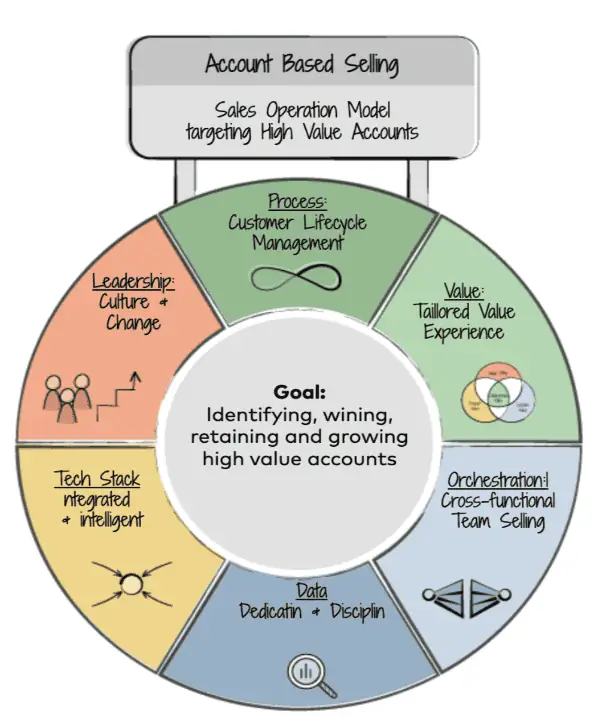
- Customer lifecycle clarity & management: Central to account-based selling is understanding the customer lifecycle management, which is not just about the seller’s process or the buyer’s process but a combination of both. This enabler emphasizes orchestrating the entire customer journey, from prospecting to account management, including upselling, support processes, and stakeholder management. The primary goal is to ensure seamless transitions and handovers throughout the customer’s lifecycle.
- Tailored Value Delivery: Beyond the initial sale, it’s vital to provide a tailored value experience that aligns with the customer’s needs. This enabler not only involves understanding and delivering the value propositions discussed during the sales process but also ensuring that they are continually monitored, adapted, and delivered to the client.
- Cross-functional team collaboration & orchestration: The days of single point contacts in key account management are long gone. Today’s enterprise sales landscape demands a cross-functional approach where team orchestration is crucial. Understanding the intricate web of who knows whom, gauging supporters and detractors of your services, and adeptly managing transitions when organizational changes occur are all part of this enabler. It’s about leveraging multiple contact points effectively.
- Data precision & governance: In the age of big data, having accurate and actionable data is paramount. This enabler stresses the importance of enriching the sales tech stack with precise data points, analyzing them, and evolving into a learning organization. Knowing what “good” looks like, especially in the context of AI, and ensuring that data not only gets recorded but also gets analyzed for actionable insights is crucial.
- Technology integration & intelligence: An efficient tech stack is more than just a collection of tools; it’s about user experience. For account managers, the technology should provide insights and learning, making their job more manageable and more effective. While data input is a necessity, the balance should be such that it doesn’t become a tedious chore but remains an avenue for gaining new insights.
- Leadership alignment & transformation: The rapid evolution in enterprise sales, especially in light of recent global events, necessitates robust leadership. As Ulrik mentioned, referencing a McKinsey study, the enterprise sales landscape has undergone more change in the past two years than in the previous decade. With challenges like hybrid sales models emerging, leadership must be proactive, adaptive, and ensure that teams aren’t mired in outdated processes.
In essence, these six enablers are not just components but foundational pillars that ensure the success of an account-based selling strategy. They underscore the importance of a holistic approach, one that intertwines strategy, value, collaboration, data, technology, and leadership into a cohesive operational model.
Turning our attention to technology, it’s evident that the embrace and comprehension of advancements, especially AI, play a pivotal role in defining the future landscape of sales.
The Role of AI in Sales
Artificial Intelligence (AI) is no longer the future—it’s the present. In the vast, interconnected universe of enterprise sales, Artificial Intelligence (AI) is emerging as a monumental force, reshaping strategies and pushing the boundaries of what’s possible. But where does AI truly fit in, especially in a domain so deeply rooted in human interactions, emotions, and decision-making? From predictive analytics that forecast customer behaviors to chatbots that provide real-time customer support, AI is revolutionizing the way businesses approach sales. As the conversation between Lee and Ulrik delved deeper into this topic, it’s safe to say that embracing AI is not just beneficial—it’s essential for businesses aiming to stay ahead of the curve.
AI's Limitations and Strengths
AI, with all its computational prowess, cannot replace the innate human curiosity or the ability to unearth unique compelling events from interactions. As Lee elaborates, finding out that a customer intends to buy a jet ski with a bonus received for achieving a specific production quality target isn’t something you can query an AI system for. It’s the human touch, the subtle art of conversation, and the inquisitive nature of a salesperson that uncovers such information.
Yet, AI’s power shouldn’t be underestimated. Ulrik emphasizes that, when used correctly, AI can revolutionize the sales process. It begins with ensuring quality data inputs, understanding what success looks like, and then using AI to identify patterns, suggest strategies, and optimize the sales approach. However, these AI-driven insights are futile unless acted upon. It’s the synergy of human curiosity and AI’s data-driven recommendations that can drive unprecedented sales success.
AI's Evolution and the Future
The journey of AI in sales mirrors the trajectory of many transformative technologies. Initially, there’s immense hype, often accompanied by misunderstandings and unrealistic expectations. Lee recalls the heydays of AI in the ’80s, while Ulrik reflects on the blockchain frenzy a few years ago. The key is understanding that AI, much like any tool – be it a spreadsheet, a hammer, or a car – has its applications and limitations.
Ulrik uses the analogy of the ‘hockey stick’ to describe AI’s potential impact. First, organizations must focus on data – its quality and relevance. Next, they need to understand and define what success looks like. With this foundation, AI can be trained, refined, and then unleashed to drive exponential growth, leading to the steep upward curve of the hockey stick.
However, there’s a cautionary note. The allure of AI, especially with its current hype, leads to a pervasive ‘Fear of Missing Out’ (FOMO) among enterprises. Leadership teams worldwide are eager to jump on the AI bandwagon, but often without a clear understanding or strategy. As AI continues its march into the domain of sales, it’s essential to remember that it’s not a replacement for human attributes but a powerful supplement. The future of sales will not be AI robots transacting with other robots but a harmonious blend of human intelligence, empathy, and curiosity, augmented by AI’s data-driven insights and recommendations. As both Lee and Ulrik concurred, the path forward is not just about harnessing AI but understanding how to synergize it with the unique qualities that only humans bring to the table.
Amidst this evolving landscape where AI supplements human intelligence, tools and platforms play a pivotal role in enhancing the synergy. One such tool that captures this ideal blend of technology and human touch is ARPEDIO. As the conversation between Lee and Ulrik progressed, it became clear that while AI offers vast possibilities, platforms like ARPEDIO are instrumental in channeling those possibilities effectively for sales professionals.
ARPEDIO's Vision and Approach to Account-Based Selling
The captivating dialogue between Lee and Ulrik provides a deep dive into the intricacies of modern sales techniques. A standout theme was the transformative role ARPEDIO plays in the domain of account planning and account-based selling.
Elevating the Sales Professional
Ulrik, representing ARPEDIO, touched on the significance of individual skill sets that sales professionals bring to the table. Yet, he emphasized that while inherent skills and past experiences are valuable, the future lies in enabling these professionals to learn from each other. ARPEDIO’s platform is designed to provide this shared learning, offering insights and actionable strategies to navigate the challenges of modern sales.
The Essence of Co-Creation
In their exchange, both Lee and Ulrik championed the principle of co-creation. Ulrik highlighted that, in ARPEDIO’s ethos, strategic management necessitates forging solutions hand-in-hand with clients. This ensures that solutions are not just efficient but are also tailor-made to resonate with each client’s unique needs.
The A.R.P.E.D.I.O Cycle
During their conversation, Ulrik explained the philosophy behind the name ‘ARPEDIO’. It stands as an acronym for Assess, Reflect, Plan, and Execute. This cycle, as he detailed, fosters a culture of continuous introspection and action, ensuring strategies evolve in tandem with client needs. Mastering this cycle, as Ulrik charmingly put it, can elevate a salesperson to the status of a “sales god”. As Ulrik cleverly highlighted, the concluding ‘DIO‘ in ARPEDIO is a nod to this elevated status, with ‘dio’ being the Italian word for ‘god’.
Action, Accountability, and Follow-Up
Lee’s inquiry into ARPEDIO’s approach towards ensuring consistent follow-up led to Ulrik detailing the platform’s capability. ARPEDIO goes beyond mere insights; it ensures that these insights translate into actionable steps. By tracking, delegating, and setting deadlines for these actions, the platform guarantees that no stone is left unturned.
Harnessing Data for Continuous Improvement
A salient point in their discussion revolved around the power of data. Ulrik elaborated on ARPEDIO’s commitment to utilizing behavioral data to foster a culture of learning. The platform’s ability to evaluate relationships and recognize potential challenges empowers businesses to be proactive rather than reactive.
Future-Proofing Sales with ARPEDIO
The looming potential of AI in the sales landscape was not lost on either Lee or Ulrik. In their discussion, Ulrik highlighted ARPEDIO’s forward-thinking approach. The platform is designed to capture and analyze the right data, laying the foundation for effective AI integration, ensuring businesses remain at the cutting edge of sales techniques.
Empowering Sales Leadership
ARPEDIO’s platform equips sales leaders and operations executives with advanced management and reporting tools. It provides real-time insights into all sales activities, facilitating better decision-making. Sales professionals can compare performance across teams, regions, and individual leaders, ensuring data-driven decisions that enhance effectiveness. The platform’s ability to measure the relative adoption and effectiveness of sales strategies further empowers sales operations leaders, allowing them to refine approaches for optimal results. Additionally, ARPEDIO fosters proactive account management by promoting regular check-ins and reflections, ensuring that account development remains dynamic and aligned with strategic goals.
ARPEDIO, as detailed in the engaging conversation between Lee and Ulrik, is not just a tool; it’s a paradigm shift in account planning and account-based selling. By emphasizing co-creation, shared learning, actionable insights, and the judicious use of data, ARPEDIO ensures businesses are poised to redefine their sales success.
Summing up
The insightful conversation between Lee Levitt and Ulrik Monberg traversed a vast landscape of sales strategies, challenges, and the transformative role of technology. Here’s what we learned from their dialogue:
- Co-creation & Customer-Centricity: Both Lee and Ulrik converge on the idea that modern selling requires a co-creation approach. To achieve success, sales teams must position themselves alongside the customer, understanding their unique needs and challenges. This collaborative approach is critical to addressing the two fundamental questions in sales: “Why change?” and “Why now?”
- The Power of Curiosity: At the heart of effective sales lies genuine curiosity. A salesperson’s ability to delve deep, ask probing questions, and unearth insights is paramount. This quality is what differentiates a great salesperson from a mediocre one. As Lee and Ulrik discuss, while certain skills can be honed, genuine curiosity cannot be instilled from scratch; it can only be refined.
- The Imperative of Action: A strategy, no matter how well-conceived, is futile without execution. The criticality of action-taking was emphasized repeatedly in the conversation. It’s not just about planning but ensuring those plans materialize into tangible actions. ARPEDIO serves as a valuable ally in this endeavor, offering tools and insights to guarantee that strategic intentions translate into actionable outcomes.
- The Role of AI: AI, with its transformative potential, was a recurring theme. Both speakers acknowledged the power of AI to revolutionize sales processes. However, they also stressed that AI is a tool, much like any other, and its efficacy is determined by the quality of input data and the clarity of objectives. Ulrik’s “hockey stick” analogy aptly captures the journey of integrating AI into sales. The initial focus on quality data, understanding success, and training AI can lead to exponential growth and benefits in the long run.
- The Fear of Missing Out (FOMO) on AI: The current zeitgeist in the business world is a palpable FOMO regarding AI. Leadership teams across industries are keen to integrate AI into their operations. However, as Ulrik points out, it’s essential to approach AI with a clear strategy rather than being swayed solely by the prevailing hype.
- The future of sales: Amidst technological advancements, the core of sales remains human interactions. Whether it’s the role of curiosity, the art of co-creation, or the nuances of understanding customer needs, the human element is irreplaceable. Tools like AI can augment these human capabilities, but they cannot replace them.
In conclusion, the dialogue between Lee and Ulrik paints a vivid picture of the future of modern selling. The realm of enterprise sales demands continuous evolution, a blend of human interactions underscored by empathy, curiosity, and the relentless pursuit of understanding customer needs. Technologies like AI present unprecedented tools and capabilities, but they augment rather than replace the human essence of sales. As highlighted by Ulrik Monberg, the trajectory is clear: account-based selling represents the future—a dynamic, engaging, and continuously evolving approach. By embracing this method, integrating AI, and moving beyond traditional account planning, businesses are well-positioned to not only meet but surpass their sales objectives.

